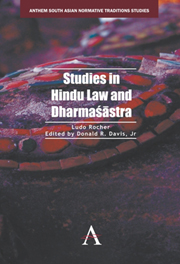Book contents
- Frontmatter
- Contents
- Foreword by Richard W. Lariviere
- Preface
- Abbreviations
- Note on the Edition
- Introduction
- PART ONE THE NATURE OF HINDU LAW
- PART TWO GENERAL TOPICS OF HINDU LAW
- PART THREE HINDU LEGAL PROCEDURE
- PART FOUR TECHNICAL STUDIES OF HINDU LAW
- Possession Held for Three Generations by Persons Related to the Owner
- The Vīramitrodaya on the Right of Private Defence
- The Technical Term Anubandha in Sanskrit Legal Literature
- The Kāmasūtra: Vātsyāyana's Attitude toward Dharma and Dharmaśāstra
- In Defense of Jīmūtavāhana
- Dāsadāsī
- The Definition of Vākparuṣya
- Janmasvatvavāda and Uparamasvatvavāda: The First Chapters on Inheritance in the Mitākṣarā and Dāyabhāga
- Karma and Rebirth in the Dharmaśāstras
- Notes on the Technical Term Sāhasa: “Fine, Pecuniary Penalty”
- Avyāvahārika Debts and Kautilya 3.1.1–11
- The Sūtras and Śāstras on the Eight Types of Marriage
- Caritraṃ Pustakaraṇe
- The Terms Niyukta, Aniyukta, and Niyoga in Sanskrit Legal Literature
- The Aurasa Son
- The Introduction of the Gautamadharmasūtra
- PART FIVE ANGLO-HINDU AND CUSTOMARY LAW
- Bibliography
- Index
Janmasvatvavāda and Uparamasvatvavāda: The First Chapters on Inheritance in the Mitākṣarā and Dāyabhāga
from PART FOUR - TECHNICAL STUDIES OF HINDU LAW
Published online by Cambridge University Press: 05 February 2013
- Frontmatter
- Contents
- Foreword by Richard W. Lariviere
- Preface
- Abbreviations
- Note on the Edition
- Introduction
- PART ONE THE NATURE OF HINDU LAW
- PART TWO GENERAL TOPICS OF HINDU LAW
- PART THREE HINDU LEGAL PROCEDURE
- PART FOUR TECHNICAL STUDIES OF HINDU LAW
- Possession Held for Three Generations by Persons Related to the Owner
- The Vīramitrodaya on the Right of Private Defence
- The Technical Term Anubandha in Sanskrit Legal Literature
- The Kāmasūtra: Vātsyāyana's Attitude toward Dharma and Dharmaśāstra
- In Defense of Jīmūtavāhana
- Dāsadāsī
- The Definition of Vākparuṣya
- Janmasvatvavāda and Uparamasvatvavāda: The First Chapters on Inheritance in the Mitākṣarā and Dāyabhāga
- Karma and Rebirth in the Dharmaśāstras
- Notes on the Technical Term Sāhasa: “Fine, Pecuniary Penalty”
- Avyāvahārika Debts and Kautilya 3.1.1–11
- The Sūtras and Śāstras on the Eight Types of Marriage
- Caritraṃ Pustakaraṇe
- The Terms Niyukta, Aniyukta, and Niyoga in Sanskrit Legal Literature
- The Aurasa Son
- The Introduction of the Gautamadharmasūtra
- PART FIVE ANGLO-HINDU AND CUSTOMARY LAW
- Bibliography
- Index
Summary
“An…important question is whether Jīmūtavāhana who is certainly a little later than the Mitākṣarā criticizes it…All that one can advance is that it is quite within the bounds of possibility that Jīmūtavāhana criticizes the Mitākṣarā” (Kane 1930–1962: 1.326–27). Here —as on many other occasions— Kane has replaced wild speculation with sober reasoning. The fact that he places Jīmūtavāhana's activity between AD 1090 and 1130 makes the Dbhā practically contemporaneous with Vijnāneśvara's YMtā. The problem whether or not Vijnāneśvara influenced Jīmūtavāhana, and whether or not the Dbhā criticized the chapter on inheritance in the YMtā, therefore, becomes all the more important. This paper intends to contribute to solving this problem through an analysis and comparison of the introductory chapters of the Dbhā and the YMtā (section on dāyavibhāga).
One cannot help being struck by the unusual length of Vijnāneśvara's introductory remarks to the chapter on dāyavibhāga. In the Nirṇayasāgara Press edition this introduction covers 123 lines, as against 38 lines for abhyupetyaśuśrūṣā, 27 for daṇḑapāruṣya, 23 for sākṣin, 19 for prakīrṇaka, 13 for dattāpradānika and vākpāruṣya, 11 for aśauca, and 10 to 1 for the other 35 chapters. It is clear that Vijnāneśvara wanted to make an important point before actually commenting on Yājnavalkya's ślokas on inheritance. The argument develops as follows:
- definition of dāya (1.2–3);
- definition of vibhāga (1.4–5);
- the specific problem to be examined in the introduction is: kasya vibhāgaḥ? (1.6).
- Type
- Chapter
- Information
- Studies in Hindu Law and Dharmasastra , pp. 527 - 538Publisher: Anthem PressPrint publication year: 2012



